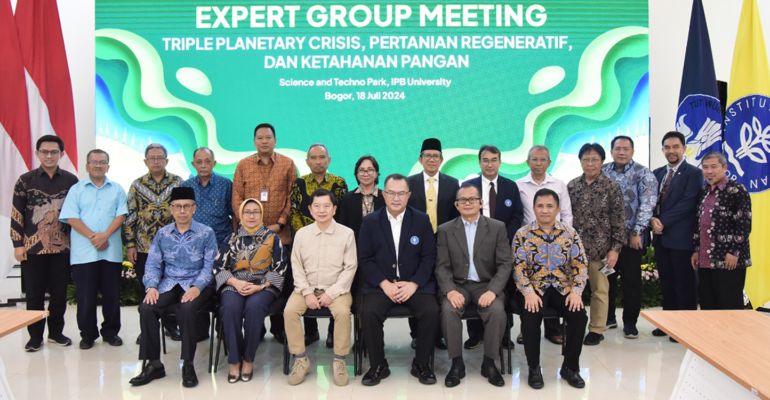Minister of PPN Encourages IPB University to Lead Land Recovery and Biodiversity in Facing Triple Planetary Crisis

Minister of National Development Planning (PPN)/ Chief of the National Development Planning Agency (Bappenas), Suharso Monoarfa asked that IPB University can lead this in order to restore land and biodiversity damaged by climate change, as well as save food security given the increasing population.
This was conveyed by Suharso during his visit to Science and Techno Park (STP) IPB University as well as conducting discussions with experts with the theme Expert Group Meeting Triple Planetary Crisis, Regenerative Agriculture and Food Security, on Thursday (7/18).
Suharso highlighted global issues related to the climate crisis, biodiversity crisis and pollution crisis or known as the Triple Planetary Crisis concept. “The Triple Planetary Crisis is increasingly receiving the spotlight as a serious threat to the sustainability of the planet where humans live,” he said.
He emised, “The agricultural sector is one of the sectors most affected by climate change and biodiversity loss. In addition, the agricultural sector can also be a contributor to environmental problems if it is not managed properly.”
He said that the Integrated Agriculture Survey (SITASI) stated that 89 percent of agriculture in Indonesia is in an unsustainable and non-linear status with the increase in population. In addition, the existence of climate change can also reduce 20 percent of the world’s gross domestic product.
“I want IPB University to restore the fertility of barren soil. I also ask the experts here to save food safety for the increasing population,” said Suharso.
Responding to that statement, the Rector of IPB University, Prof Arif Satria said that IPB University was ready with a request from the Chief of Bappenas.
“We are ready with the soil health restoration program through the support of various innovations that we have, besides that there needs to be a second scheme in the form of further research considering the diverse nature of the land, so that the program runs quickly,” he said.
In the discussion, Prof Arif conveyed various innovations related to food commodities such as rice, sorghum, onions, and chillies that are highly productive and disease resistant, as well as technology to restore soil contaminated with palm oil waste.
“This meeting is expected to produce solutions and concrete steps that are constructive in encouraging regenerative agriculture in Indonesia. By adopting sustainable agricultural practices, Indonesia can maintain soil health, increase food security, and contribute to achieving sustainable development goals,” said Prof Arif.
In that activity, a soil science expert, Prof Arif Hartono; Chief of the International Research Institute for Environment and Climate Change IPB University, Prof Rizaldi Boer; Chief of the International Research Institute for Food, Nutrition, and Health, Prof Drajat Martianto; and Chief of the Centre for Tropical Horticulture Studies (PKHT), Prof Dr Awang Maharijaya. (dh/Lp) (IAAS/IAN)



